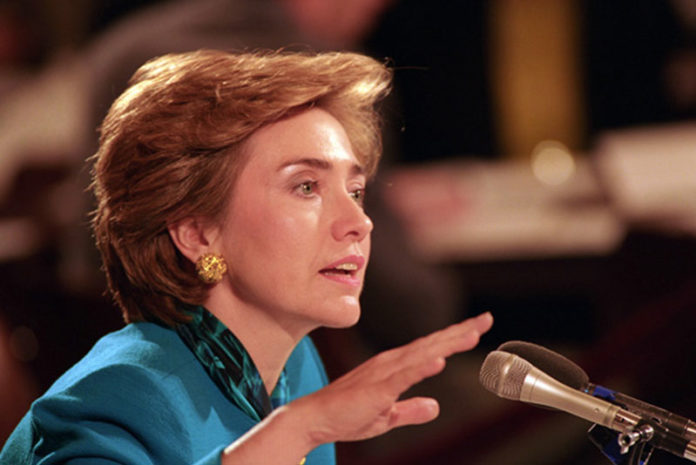Judicial Watch today announced oral argument will be heard Friday, September 22, 2017, in Judicial Watch’s appeal (No. 16-5366) regarding its Freedom of Information Act (FOIA) lawsuit seeking the draft indictments of Hillary Clinton over what is popularly known as the Whitewater scandal. The National Archives confirmed that draft indictments of Clinton exist but refused to release the records.
Date: Friday, September 22, 2017
Time: 9:30 a.m. ET
Location: Courtroom 20
United States Court of Appeals for the DC Circuit
333 Constitution Ave NW
Washington, DC 20001
The appeal stems from a March 9, 2015, FOIA request and an October 20, 2015, Judicial Watch Freedom of Information Act (FOIA) lawsuit (Judicial Watch v. National Archives and Records Administration (No. 15-cv-01740)) seeking:
All versions of indictments against Hillary Rodham Clinton, including but not limited to, Versions 1, 2, and 3 in box 2250 of the Hickman Ewing Attorney Files, the “HRC/_ Draft Indictment” in box 2256 of the Hickman Ewing Attorney Files, as well as any and all versions written by Deputy Independent Counsel Hickman Ewing, Jr. prior to September of 1996.
The draft indictments relate to allegations that Clinton provided false information and withheld evidence from federal investigators to conceal her involvement with the defunct Madison Guaranty Savings & Loan, the collapse of which lead to multiple criminal convictions. Clinton provided legal representation to Madison Guaranty as an attorney at the Rose Law Firm in Little Rock, Arkansas. Clinton’s Rose Law Firm billing records, long sought by prosecutors, were found in the private quarters of the White House shortly after an important statute of limitations had expired.
The National Archives argues that the documents should be kept secret, citing grand jury secrecy and Clinton’s personal privacy.
Judicial Watch attorneys argue that since an “enormous amount of grand jury and other information from the independent counsel’s investigation of Clinton has already been made public, including a January 5, 2001 Final Report of the Independent Counsel and a 206-page “Summary of Evidence Memorandum” detailing the potential charges against Clinton, there is no secrecy or privacy left to protect.”
Judicial Watch believes the records include an evolving set of draft indictments, written between 1996 and 1998. The draft indictments reportedly arose out of the Office of Independent Counsel investigation into Clinton’s involvement in an allegedly fraudulent transaction, Castle Grande, involving the assets of Madison Guaranty Savings & Loan. Clinton was alleged to have drafted an option agreement that concealed from federal bank examiners a fraudulent $300,000 cross-loan to the Castle Grande project. Mrs. Clinton’s grand jury testimony – and her alleged concealment of her role in this fraudulent transaction, including the hiding of her Rose Law Firm billing records concerning her legal work for Madison – reportedly became the subject of an obstruction of justice and perjury investigation.
In March 1999, Ewing testified that three years prior he had drafted and circulated but abandoned an indictment of Mrs. Clinton. The New York Post reported:
Ewing said he “had problems” with some of her statements to investigators in April 1995 and drafted an indictment shortly after September 1996. He said he showed it to other prosecutors in Starr’s office but went no further.
Last year, Judicial Watch separately reported “Mrs. Clinton ‘may have been involved in a crime in 1986,’ according to never-before-seen portions of an Office of Independent Counsel (OIC) memorandum.”
“Why on Earth is President Trump’s Justice Department defending Hillary Clinton by keeping information about her well-known corruption secret? Who is running the store at the Justice Department?” asked Judicial Watch President Tom Fitton. “Tax dollars are wasted as the Deep State rolls along in its frantic efforts to protect Hillary Clinton. President Trump should demand to know why his agencies are defending Hillary Clinton.”
Friday’s oral argument is scheduled to be heard by DC Circuit Judges Judith W. Rogers, David S. Tatel and Laurence H Silberman.






























